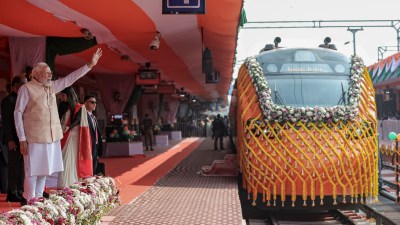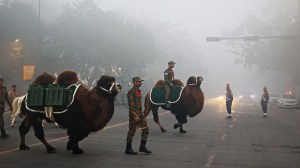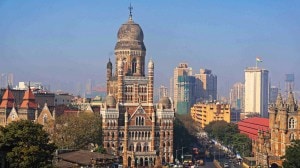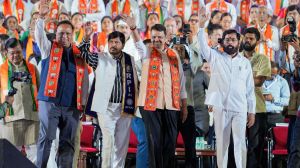Reading between their poverty lines
One of Gandhiji8217;s more unfortunate legacies to our fair and wondrous land was his deification of poverty. He may not have meant this to...

One of Gandhiji8217;s more unfortunate legacies to our fair and wondrous land was his deification of poverty. He may not have meant this to be a lasting legacy and only voiced his identification with the poorest of the poor, wore home-made khadi and travelled in third class carriages to speak for the voiceless and the dispossessed. And, it may have been a good idea at the time although complex even then since despite Gandhiji8217;s admiration for poverty in matters of apparel and transportation he had no problem spending the night in the mansion of some millionaire.
In any case, what was a good idea at the time of our freedom struggle has since become one of the reasons why we remain one of the poorest countries in the world. How can a country whose political leaders continue to wear poverty like a badge of honour ever dream of prosperity?
When it comes to glorifying the 8216;8216;common man8217;8217; such an offensive description and speaking for 8216;8216;the masses8217;8217; our political leaders share a unanimity that transcends party lines.
So despite ten years of economic reforms8212;whose ostensible purpose is to make India rich8212;we still do not have a single political leader who has dared stand on a public platform and say 8216;8216;it is glorious to be rich8217;8217; or whatever it is Deng Xiaoping said when China ditched Maoism for capitalism.
This is why it interested me to read a recent interview with L.K. Advani in which he said that one of the things he disliked was India being called a 8216;8216;developing8217;8217; country. He would like to hear it being called a developed country, he said, and hoped this would happen soon enough for him to see.
For a man who counts the Swadeshi Jagran Manch among his fellow-travellers this is a remarkable statement. Only, he seems not to have fully understood what he said because soon after this interview he led the charge against disinvestment that resulted in the two public sector oil giants8212;HPCL and BPCL8212;remaining in government hands.
If it had not been for the Deputy Prime Minister8217;s powerful support George Fernandes and his ilk would not have mattered. Fernandes is something of a joke in economic circles after he passionately opposed the disinvestment of IPCL Indian Petrochemicals Corporation Limited on grounds of national security only to discover that it made plastic buckets and had nothing to do with oil.
But, Advani8217;s voice counts more and more in the Vajpayee government so if he would like to see a 8216;8216;developed8217;8217; India he needs to be very careful what he opposes. Where disinvestment is concerned, for instance, he needs to notice that the worth of public sector shares rose by Rs 75,000 crore between January and June this year because of the hope of privatisation. They have crashed since the government announced that it was postponed.
Advani needs also to observe that if we were not wasting taxpayers8217; money on vast, unprofitable public sector empires we might find the money to spend on the essentials of a 8216;8216;developed8217;8217; country.
Airports, for instance. We do not have a single airport that would be considered a modern, international airport by today8217;s standards. No traveller entering India through Mumbai or Delhi8217;s disgraceful arrivals terminals could think of it as a developed country. No traveller bumping along our ancient roads or rickety train services would have any illusions about our 8216;8216;developing8217;8217; status either.
Then, there are the other horrors that wallowing proudly in poverty have resulted in. If our metropolitan cities look like slums8212;with Mumbai airport being quite literally in the midst of a huge, hideous slum8212;our small towns are even worse.
They lack even the most basic, modern facilities like clean streets, properly laid out bazaars, public buildings that have some aesthetic appeal. And, if they are bad then our villages are hellholes that should be declared unfit for human habitation. This decay in our physical and natural environment has happened in fifty years of Gandhian austerity and ehruvian socialism.
The India that the Britis Raj left behind had lovely towns and cities that have been allowed to decay because we were 8216;8216;too poor8217;8217; to bother about beauty, aesthetics or town planning. There are other things developed countries take for granted like uninterrupted supplies of clean power and water, like modern schools and health care. These are all things that come through prosperity and prosperity can only come if the government follows economic policies that are wise and that despise poverty instead of thinking of it as an honourable state of being.
If the Deputy Prime Minister would like to put his money where his 8216;8216;developed8217;8217; mouth is then let him lead economic reforms in the government instead of being the leading obstacle to them. Let him go on a study tour of China and Southeast Asia and examine why these countries that used to be much poorer than us less than twenty years ago are now so far ahead.
And, please let us not fool ourselves into believing that it is because we are a democracy that we change so slowly. We change slowly because we have had lousy economic policies and no political leaders so far who dare exalt prosperity as a goal worth reaching. They continue to exalt poverty in the Mahatma8217;s memory often quoting him when they do so. Happy birthday, Gandhiji.
Write to tavleensinghexpressindia.com
- 01
- 02
- 03
- 04
- 05































